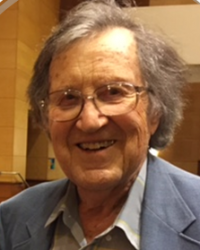“Quaker Funeral” - William Matchett, 2013
Fairest one, folded in flowers,
wrapped in the warmth of the hidden heart of the rose,
while the cold hand traces the edges of empty hours
and the light comes and goes,
help us, in this final meeting
in a room blessed with the echo of words you have spoken,
discover our peace in your knowledge that life, though fleeting,
leaves love unbroken.
Here, among friends, in sorrow,
let the Living Love in the silence reveal the seed
of your strength, that we may share it in facing tomorrow,
the time of our need.
It is with sadness that the English Department reports the passing of Emeritus Professor William (Bill) Matchett. Professor Matchett was a faculty member in the department from 1954 until he retired in 1982, although he continued teaching and writing since leaving the UW. His book, Airplants: Selected Poems, was published in 2013, and follows two previous books of poetry, The Water Ouzel and Fireweed, which won the Washington State Governor’s Award. Richard Wilbur once praised his verse for being “full of wit and range and conversancy […] distinguished throughout by a simple humanity of spirit,” and M.S. Merwin celebrated it for its “quiet tone, in a pastoral mode.” Matchett was also the author of the monograph Shakespeare and Forgiveness and co-author of Poetry: From Statement to Meaning. His stories, articles and other criticism appeared in dozens of magazines, including The New Yorker, Saturday Review of Literature, Harper’s and The New Republic.
Chicago born, Dr. Matchett attended Swarthmore College and Harvard. It took Matchett eight years to get through Swarthmore, being interrupted by WWII, during which he was assigned as a conscientious objector, first to a Civilian Public Service camp in New Hampshire and then as a research subject at the Psycho-Acoustic Laboratory in Cambridge, MA. After graduation from Swarthmore in 1949, he married and returned to Cambridge to pursue a Ph.D. at Harvard. While there, he had a teaching assistantship working with students in Archibald MacLeish’s immensely popular poetry course, and was one of the founders of the Poets’ Theatre, active with it until his departure in 1954. In the late 1970’s as a professor in UW’s English department, Matchett supervised soon to be eminent fiction writer Marilynne Robinson’s dissertation. Robinson went on to win the Pulitzer Prize for Fiction in 2005, a National Humanities Medal in 2012, and the Library of Congress Prize for American Fiction in 2016. In addition to Matchett’s teaching at the UW, he spent nineteen years as editor of the Modern Language Quarterly, a period of association with Carolyn Kizer in editing the first year of Poetry Northwest, and a term as Chair of the UW faculty Senate.
Matchett and his family attended the University Religious Society Friends Meeting in Seattle, just off our campus. In accordance with his Quakerism, Dr. Matchett firmly stood for peace, equality, justice, and non-violence. After retirement, he made his home on Hood Canal, where he and his wife had already been spending summers and where they have been much involved in environmental politics. In his later years Bill served as President of the Hood Canal Environmental Council from 1992 to 2012, advocating successfully to dramatically increase the health of the waterway.
The College of Arts and Sciences featured a profile of Professor Matchett in 2014. In 2016, Professors Brian Reed and Frances McCue videotaped a long, wide-ranging conversation with him about the history of the UW English Department, his remembrances of his colleagues, and the many ins and outs of his long career. Outtakes from this spirited occasion are available on the English Department web site, including clips of him reading two of his poems. Dr. Reed reports: “It was an honor to sit down with Professor Matchett and learn about our department’s storied past. He spoke about towering, distant gods in our local mythology—Ted Roethke, Bob Heilman, Richard Hugo—with an easy familiarity.”
In 2018 Dr. Matchett published his last article, a piece for the University of Washington Magazine titled “Powerhouses of poetry have visited UW in tribute to one of their own.” In it, Matchett recounts his cofounding and curating the first twenty-five years of the English Department’s famous Theodore Roethke Memorial Poetry Readings series. The prominent poets Matchett recalls hosting seem to have tumbled out of a Norton Anthology, among them John Berryman, Elizabeth Bishop, and Robert Lowell. In this article, beneath Matchett’s clear accounting, one might detect a degree of hooded amusement. Take for instance the anecdote Matchett chooses to relate about inaugural invited Roethke Reader, literary giant John Crowe Ransom:
“To open the series, we invited John Crowe Ransom, whom, already in his 80s, we wanted to be sure to include. He gave a fine reading. I especially remember his gusto in presenting ‘Captain Carpenter.’ There was, however, an embarrassing moment. He apparently forgot in whose honor the readings had been established and took the occasion to pay a lengthy tribute to Wallace Stevens, who had died a few years earlier. Ransom was not, however, one of the many poets we had to reassure that we wanted them to read their own poems, not Ted’s.”
The English Department is poorer for the loss of Professor Matchett, and deeply indebted to the fruits of his good work. Rest in peace.
